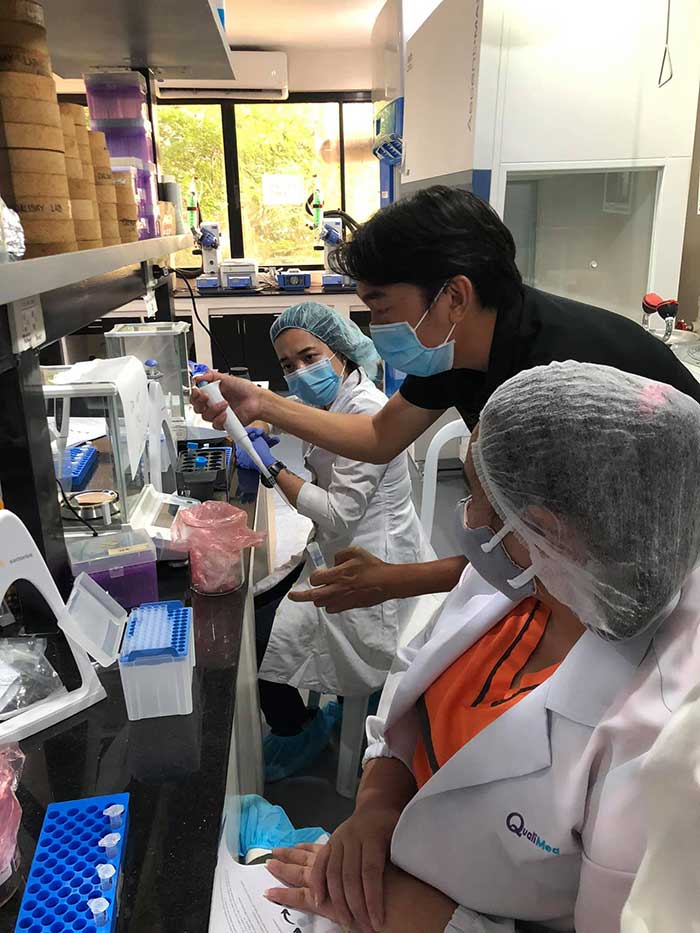
The lack of testing kits and the slow turnout of the samples are the two leading causes of the delay in the detection of the Delta variant of COVID-19 in Antique.
In an interview with Radyo Pilipinas Iloilo on Sunday, Dr. Victor Marco Emmanuel Ferriols, program director of Philippine Genome Center Visayas and associate professor of the College of Fisheries and Ocean Sciences-Institute of Aquaculture of University of the Philippines Visayas (CFOS-UPV) explained that samples from Western Visayas are transported to the Philippine Genome Center (PGC) in Diliman to undergo sequencing for COVID-19 variants.
The sequencing involves the investigation of SARS-CoV-2, the virus that causes COVID-19, to find out if it is an original or mutated form of the virus.
The Delta variant has been a cause of concern as it is considered more transmissible and accounted for most hospitalizations in recent infections.
Every week, the Department of Health (DOH) allocates samples for each region for detection of variants.
On regular days, Ferriols said that the turnaround time for the samples (the time for the results to be released) would last up to seven days as the samples undergo rigid quality check.
“Generally, it undergoes seven days nga process. Before sequencing, kinahanglan i-subject sa quality check ang mga samples because it is possible during transport nga kon indi manami ang packaging indi makapasar sa quality check, that is why medyo madugay,” he added.
Last week, the Department of Health (DOH) confirmed that the Delta variant was detected in Western Visayas, particularly in a couple from Antique.
The two local cases involved senior citizens from Pandan, Antique who manifested symptoms on May 27, 2021 and tested positive for COVID-19 two days later.
The specimens of the two cases were sent to the PGC for genome sequencing on June 11 but the result indicating that the two were positive for the Delta variant only came out on July 9.
The two patients were admitted to a hospital in Pandan but the woman passed away last May 31. She had Type 2 diabetes.
According to Ferriols, there was a delay on the detection of the variant because at that time, there were limited testing kits.
“It took some time na ma-report ang Delta cases sa Antique because at the time, sang nagpadala samples, natabuan nga malawig ang pag-process, late napadala halin sa Western Visayas kag kulang ang kits,” he said.
Meanwhile, Dr. Glen Alonsabe, DOH-6 regional epidemiologist, said in a press conference last week that the releasing of the sequencing results was delayed by more than a month due to the bulk of specimens processed by the PGC.
DOH-6 has already ordered the immediate tracing and isolation of all close contacts of the two Delta cases in Pandan, Antique.
The health department also advised the local government unit to identify a separate isolation facility for close contacts and suspected COVID-19 cases that were traced to the Delta cases while waiting for their result.
Around 58 samples from Western Visayas were also sent to PGC in Diliman for genome sequencing, according to Ferriols.
They are expecting the results to be released after seven days or within the week.
The Delta variant which originated from India was first detected in the Philippines last May involving returning Overseas Filipino Workers (ROFs) from the United Arab Emirates.
Ferriols said that the Delta variant is 51 to 67% more transmissible than the Alpha variant or UK variant.
The Alpha variant on the other hand is 50% more transmissible from the original Covid-19 variant first detected in China. (ERS)
















